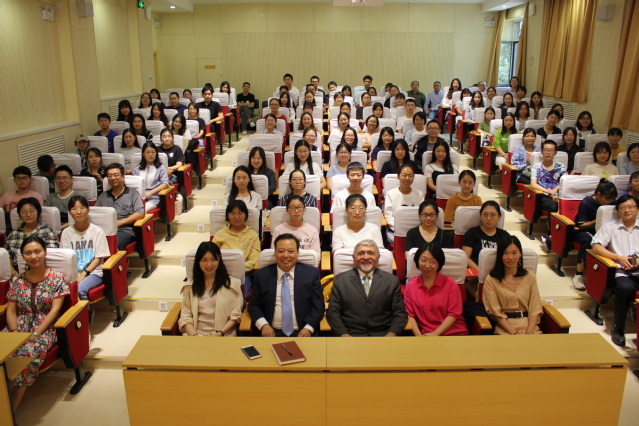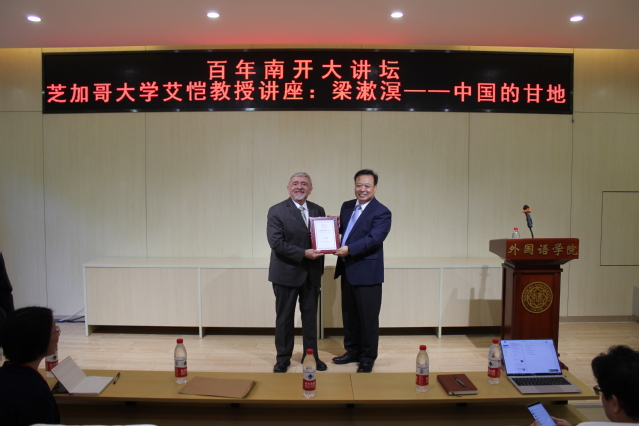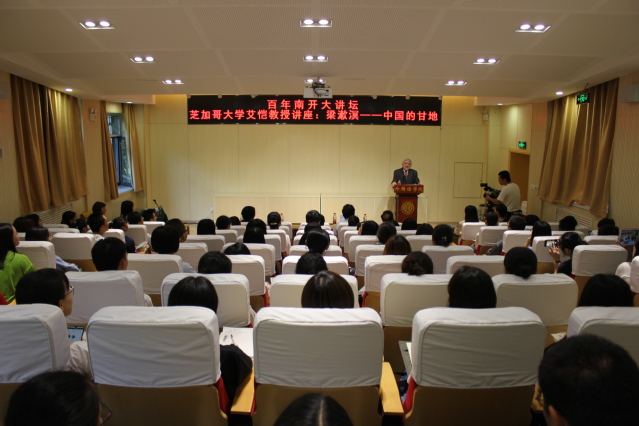
“Professor Alitto and I wanted to enter the lecture hall but we couldn’t, because the door was blocked by the people who would like to attend the lecture.”, said by professor Yan Guodong, the dean of CFL and the head of Regional and National Research Center of Nankai University, in his hosting of the lecture themed “Liang Shuming—Gandhi in China” on September 24.
Professor Guy Salvatore Alitto, an American historian from Chicago University, is the lecturer. He is one of the most active and influential sinologists in contemporary society and is called as the first man on Liang Shuming research. He learned from John King Fairbank and Benjamin I. Schwartz, wrote The Last Confucian, Has Man a Future—Dictation from Elderly Liang Shuming and other monographs and was awarded the “Prize for Special Contribution on Chinese Books” by Chinese government in 2015.

Outstanding and celebrated as he is, he appreciated Professor Yan Guodong for his introduction on him in modesty and then began his lecture in a rather fluent Chinese. As the first, he mentioned that Chinese civilization is the most successful civilization in the world, which has passed for thousands of years yet has never vanished. Liang Shuming was the very Chinese scholar who systematically and convincingly demonstrated such characteristics of Chinese culture. Professor Alitto specially emphasized that Mr.Liang was not just a thinker who meditated at bookroom every day, but, in essence, a practitioner like Gandhi, based on a face-to-face interview with Liang Shuming in his late years.
Professor Alitto stated that the life-long odyssey of Liang Shuming is the best proof of what he had mentioned above. At the age of 11, Liang was proactively involved in the national movement aiming at resisting American products at that time. In his 18, he was in risk of participating in 1911 Revolution. In 1917, he was invited to Peking University to give lecture and carried a pamphlet entitled How about the People if We do Nothing written by himself to popularize his belief on ending the civil war and confront the external enemy together. After the publication of his representative monography Chinese and Western Cultures and Philosophies, Liang mainly focused on the practice of “how to restore Confucian culture”, primarily piloting in Zouping county, Shandong Province and gradually discovering the answer of “rural construction”.

Professor Alitto also mentioned that Liang Shuming kept friendly relationship with scholars from different fields and politicians when actively pursuing the social reform. Though Liang devoted his whole life to the restoration of Confucian, he believed in Buddhism, appreciated the philosophy of Daoism and respected Christianity, which perfectly reflected the feature of inclusiveness in Chinese culture. In the end, professor Alitto expressed that Liang’s virtue and character were also the kernel which had driven him to do research on him, besides his academic thoughts and social practice. Liang acted to practice his minds, which exactly indicated the ethos of integrity for an “authentic Confucian”.
After professor Alitto finished his lecture, the attendees raised questions and had a heated discussion with professor Alitto in terms of the coherent contribution made by Liang Shuming to the rural construction, the core features of Confucian, the confidence in culture of socialism with Chinese characteristics. There were still several audiences raised their hands wanting to communicate with professor till the last second of the lecture.
It was said that the lecture belonged to series lecture of the Great Rostrum of 100th Anniversary of Nankai University. Professor Yan Guodong granted professor Alitto with the plaque of “Lecturer of the Great Rostrum of 100th Anniversary of NKU”. Before and after the lecture, Yan Guodong, the dean of CFL, and Wang Kai, the deputy dean, had a friendly meeting with professor Alitto respectively, with Yang Lin, who is in charge of Italian department as the attendee.



